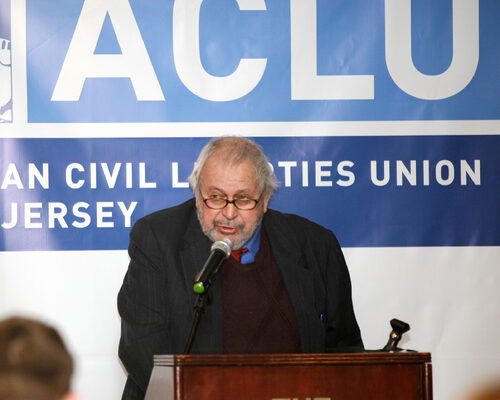No number of words can do justice to what Frank Askin did in service to the cause of justice itself.
For more than 50 years, Frank Askin devoted everything within him to the principles of liberty, equality, fairness, and personal freedom. Even a word like devotion – it doesn’t suffice to capture truly how fully Frank served making the world better. He found creative ways to use intellect, empathy, and rigor to outmaneuver the forces seeking to diminish our freedoms.
Frank was a national ACLU board member, and ACLU general counsel – in other words, at the organization with a historic number of appearances before the Supreme Court, they chose Frank as their trusted adviser.
He founded and led the Rutgers Constitutional Law Clinic – which would become the Constitutional Rights Clinic – in the 1960s, often partnering with the ACLU-NJ as co-counsel. His leadership and brilliant strategy helped the law school earn the moniker The People’s Electric Law School.
He served on the board of the ACLU of New Jersey, and he litigated some of the organization’s most important cases. In the aftermath of the Newark Rebellion, in which police brutalized the city, he represented people whose rights had been violated through unjust arrests and acts of police violence. He took on secret dossiers kept on file by the Jersey City Police Department, and he fought government surveillance programs to keep tabs on activists. He won a case before the U.S. Supreme Court in 1979 to set the standard of reasonable suspicion for police to stop drivers, and he became known nationally as a pioneering legal mind on cases concerning random police stops. He litigated landmark cases to establish free speech in two key modern public squares with private governance: shopping malls and in communities run by homeowners’ associations. He secured the right of homeless people to vote. He consistently acted with foresight to seize on emerging civil liberties issues. He sought re-enfranchisement of people on probation on parole in the courts, and although he lost the battle, his argument ultimately won the war, with legislation to restore the right to vote for formerly incarcerated people signed in 2020.
Even that reflection is only a surface introduction to the legacy Frank leaves. And, crucially his legacy lives on through the generations of lawyers and advocates who learned under Frank to practice the discipline of making our world a more just, freer place. He didn’t just apply the Constitution to legal issues, but found new applications for the Constitution to expand our liberty.

